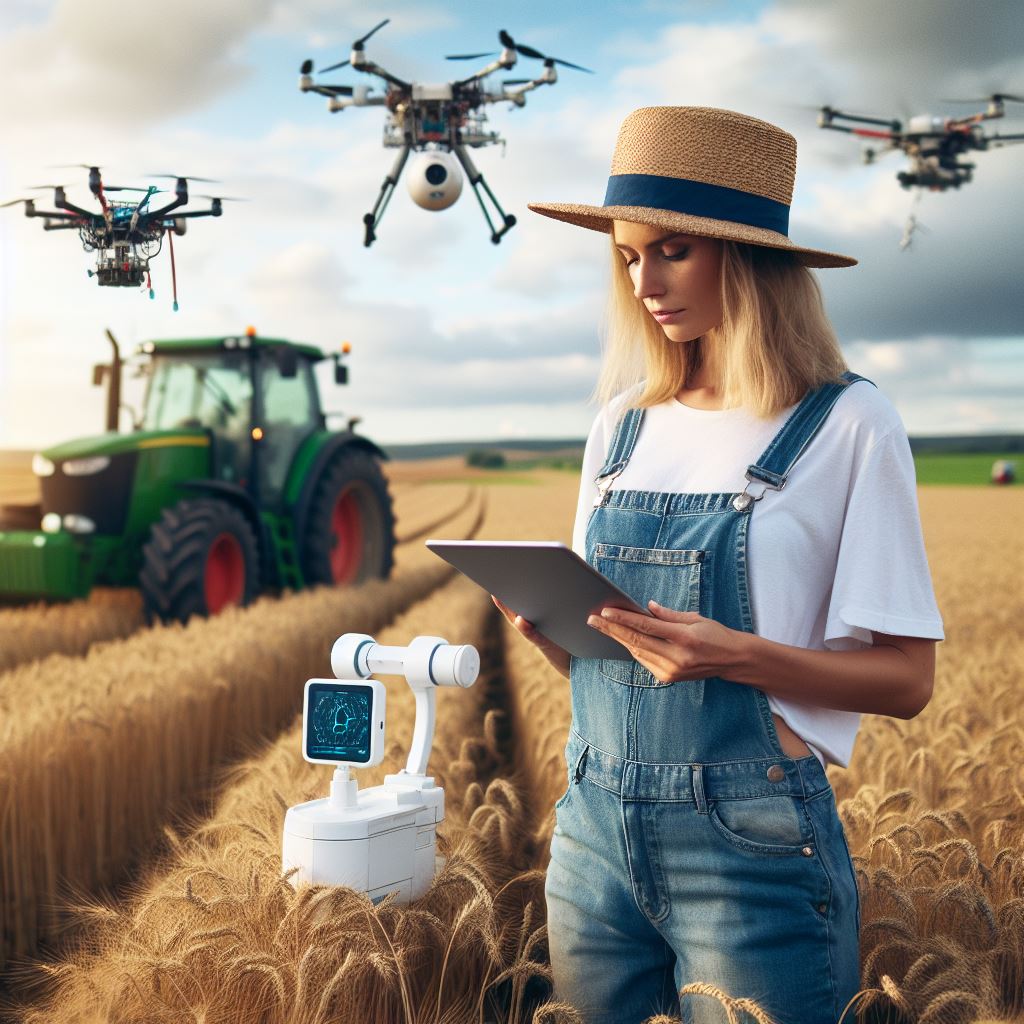Introduction
Digital age farming and its impact on the agriculture industry
Digital age farming has revolutionized the agriculture industry through technology and automation.
These advancements enhance efficiency, productivity, and sustainability by optimizing resource use, reducing waste, and mitigating environmental impact.
Farmers can make data-driven decisions, monitor crop health in real-time, and automate tasks, leading to higher yields and lower costs.
Digital farming also fosters connectivity and knowledge-sharing, empowering farmers to adapt to evolving challenges and seize opportunities in a rapidly changing agricultural landscape.
Millennials playing a significant role in modern farming
Millennials are playing a significant role in modern farming, bringing innovation, sustainability, and efficiency.
Embracing digital tools, urban farming, and alternative farming methods, they bring fresh perspectives to traditional practices.
With a focus on transparency and environmental stewardship, millennials are driving innovation and promoting a more inclusive, resilient, and sustainable future for agriculture.
The rise of millennials in agriculture
The face of farming is changing rapidly, with millennials taking on a significant role in the field.
The young generation is increasingly showing interest and actively participating in agriculture, paving the way for a future of innovation and sustainability.
Statistics on the increasing number of millennials involved in farming
Recent statistics highlight the substantial increase in the number of millennials involved in farming.
According to a USDA report, the number of farmers under the age of 35 has increased by 2.2% in the past five years.
This rise signifies a shift in the demographics of agriculture, as the younger generation steps up to contribute.
Reasons behind their interest in agriculture
Several reasons can explain the growing interest of millennials in agriculture:
Desire for sustainable and organic farming practices
Millennials are concerned about the environment and prioritize sustainable practices.
They seek out farming methods that minimize harm to nature, such as organic farming.
Transform Your Agribusiness
Unlock your farm's potential with expert advice tailored to your needs. Get actionable steps that drive real results.
Get StartedThis generation believes in leaving a positive impact on the planet through responsible agricultural practices.
Technology-driven approach to farming
Millennials are tech-savvy and embrace innovation.
They see agriculture as an industry ripe for technological advancements.
By adopting cutting-edge technologies like precision farming, drones, and IoT devices, young farmers can optimize their operations, increase efficiency, and reduce the environmental impact of farming.
Interest in local food production and farmers markets
Millennials are conscious of the quality and origin of their food.
They prefer locally sourced produce to support the local economy and reduce carbon footprint associated with long-distance transportation.
Many young farmers find fulfillment in providing fresh, nutritious food to their communities through farmers markets and direct-to-consumer channels.
With these motivations at the forefront, millennials in agriculture are redefining the way farming is perceived and practiced.
They are taking proactive steps to address sustainability challenges, leverage technology, and connect consumers with local food sources.
This shift is bringing about a positive change in the agricultural landscape.
Furthermore, by embracing sustainable and organic farming practices, millennials are safeguarding the environment and ensuring the long-term viability of the agricultural sector.
Their commitment to responsible farming methods helps preserve soil quality, protect water resources, and promote biodiversity.
As a result, farming becomes a catalyst for ecological balance and a more resilient food system.
Moreover, the technology-driven approach of millennials revolutionizes traditional farming practices.
By utilizing precision farming techniques, they can optimize resource allocation, minimize waste, and improve crop yields.
Drones and remote sensing technologies enable young farmers to monitor crop health and detect issues before they escalate.
Automation streamlines repetitive tasks, freeing up time for more strategic decision-making and overall productivity.
Finally, millennials’ emphasis on local food production and engagement with farmers markets fosters a sense of community and builds trust between producers and consumers.
This direct connection allows for transparency in the food chain, enabling consumers to make more informed choices about their nutrition.
Millennials aspire to provide food that is not only healthy but also ethically and sustainably produced, leading the way towards healthier eating habits for the society as a whole.
In essence, the rise of millennials in agriculture signifies a promising shift towards a more sustainable, innovative, and community-oriented farming industry.
The increasing number of young farmers, driven by their desires for sustainable and organic farming practices, technology-driven approaches, and local food production, demonstrates their commitment to shaping a future where agriculture ensures both food security and environmental health.
The benefits of millennials in farming
The technological skills and adaptability of millennials
Millennials, known for their proficiency in technology, bring valuable skills to the farming industry.
Their ability to adapt quickly to new technological advancements allows them to efficiently operate modern farming equipment.
Showcase Your Farming Business
Publish your professional farming services profile on our blog for a one-time fee of $200 and reach a dedicated audience of farmers and agribusiness owners.
Publish Your ProfileThese digital natives are adept at using precision agriculture technology, such as GPS systems and drones, to maximize crop productivity.
Additionally, their familiarity with mobile applications and data analytics enables them to make informed decisions for crop management.
The potential for innovation and efficiency in farming practices
Millennials have a keen interest in sustainability and a strong drive to find innovative solutions for farming challenges.
Their fresh perspective encourages them to experiment with alternative and eco-friendly agricultural practices.
By incorporating advanced techniques like hydroponics, vertical farming, and aquaponics, millennials contribute to increased efficiency and resource conservation.
Their commitment to sustainable farming practices helps minimize the environmental impact and promotes long-term viability of the industry.
The importance of millennials’ connection to consumers and ability to meet changing demands
Millennials possess a unique understanding of consumer preferences and are connected to their demands through social media and online platforms.
This direct connection with consumers allows them to target niche markets and respond to changing trends swiftly.
Their ability to adapt farming practices to meet consumer demands for organic produce, ethically sourced goods, and locally grown food is invaluable.
Millennials’ consumer-centric mindset ensures that farming practices align with market needs and enhances customer satisfaction.
In general, millennials contribute greatly to the farming industry with their technological skills, adaptability, innovative mindset, and consumer awareness.
Their proficiency in utilizing advanced agricultural technologies helps maximize productivity and minimize environmental impact.
Moreover, their connection with consumers and ability to meet evolving demands ensure the industry stays relevant and sustainable.
Embracing the potential of millennials in farming is crucial for the continued growth and success of agriculture in the digital age.
Read: From Seeds to Startups: Young Farmers’ Path
Challenges faced by millennials in agriculture
Common stereotypes and misconceptions about millennials in farming
Millennials are often labeled as lazy and entitled, but their work ethic and dedication to farming should not be underestimated.
They are eager to learn new techniques and are open to incorporating technology into farming practices.
Financial challenges and barriers faced by young farmers
High startup costs
Millennials face significant financial hurdles when starting their farming ventures.
The cost of land, equipment, and infrastructure can be prohibitively expensive, making it difficult for them to enter the industry.
Government loans and grants are often necessary to bridge the financial gap.
Limited access to land and resources
Finding available and affordable land for farming is a major challenge for young farmers.
The rising cost of real estate and competition from large corporate farms leave millennials with limited options.
Additionally, access to resources such as water, fertilizers, and pesticides can be constrained, affecting their productivity.
Collaborations and partnerships with experienced farmers can help overcome these limitations.
Lack of knowledge and experience
Many millennials entering the agriculture industry lack the practical knowledge and experience necessary to succeed.
They may have a passion for farming but need guidance on best practices, crop selection, and pest management.
Access to mentorship programs and agricultural education can help bridge this knowledge gap.
It is crucial to promote learning opportunities and facilitate knowledge transfer to empower young farmers.
Read: Heritage Farming: Preserving Traditions

Support and resources for millennials in agriculture
Millennials are entering the field of agriculture with enthusiasm and a drive to innovate.
However, they often face unique challenges due to lack of experience, limited resources, and a rapidly changing industry.
To help young farmers succeed, various government programs and initiatives have been implemented to provide support and resources.
Additionally, mentorship and networking opportunities play a crucial role in promoting success in the agricultural sector.
Government programs and initiatives targeting young farmers
Grants and subsidies
Government agencies provide financial assistance to help young farmers establish and expand their agricultural ventures.
These grants and subsidies can be used for land acquisition, equipment purchases, or to implement sustainable farming practices.
Training and education programs
Many governments offer training and educational programs specifically designed for young farmers.
These programs provide valuable knowledge and skills necessary to succeed in modern farming techniques, such as precision agriculture, organic farming, and agroecology.
Loan programs for young farmers
Financial institutions collaborate with government agencies to offer loan programs tailored to the needs of young farmers.
These programs provide flexible repayment options, lower interest rates, and access to capital for purchasing or leasing land, equipment, or livestock.
Importance of mentorship and networking
Mentorship
Mentorship programs connect young farmers with experienced individuals who can provide guidance and share their expertise.
Showcase Your Farming Business
Publish your professional farming services profile on our blog for a one-time fee of $200 and reach a dedicated audience of farmers and agribusiness owners.
Publish Your ProfileMentors can offer valuable insights into market trends, best practices, and challenges that young farmers may face.
They also provide emotional support, helping millennials navigate the stresses and uncertainties of starting a farming career.
Networking opportunities
Young farmers can benefit from networking events and platforms that facilitate connections with other professionals in the industry.
These opportunities foster collaboration, knowledge sharing, and potential partnerships.
By building a strong network, young farmers gain access to resources, market insights, and possible customers or distributors.
Additionally, mentorship and networking create a sense of community among millennials in agriculture, providing a platform for sharing successes and challenges.
This support system contributes to the overall growth and innovation of the industry as young farmers exchange ideas and learn from one another.
In summary, millennials in agriculture have access to a range of support and resources.
Government programs provide grants, subsidies, training, and loan opportunities to help young farmers navigate the challenges of starting their own agricultural businesses.
Mentorship and networking opportunities offer guidance, expertise, and a sense of community for millennials.
With these resources and support systems in place, the digital age farming sector can thrive as young farmers bring innovation and sustainability to the field.
Read: Innovative Farming on 10 Acres: A Journey
Success stories of millennial farmers
In the world of farming, millennials are making waves with their innovative approaches and strategies.
In this section, we will share inspiring success stories of young farmers who have embraced digital age farming and discuss the valuable lessons that can be learned from their experiences.
Inspiring Stories of Successful Young Farmers
Jane Thompson, a 28-year-old farmer from Iowa, transformed her family’s traditional farm into a thriving digital venture.
By leveraging technology such as IoT sensors and data analytics, she optimized crop yields and reduced waste.
Her farm is now a model of efficiency and sustainability.
Mark Davis, a 30-year-old farmer from Kansas, used social media platforms to connect directly with consumers and market his organic produce.
Through engaging content and transparent farming practices, he built a loyal customer base and increased his revenue significantly.
Sarah Hernandez, a 26-year-old hydroponics farmer from California, adopted vertical farming techniques and integrated automation into her greenhouse.
By controlling environmental factors with precision, she achieved higher crop quality and increased productivity year-round. Her success story has inspired other young farmers to explore hydroponics.
Innovative Approaches and Strategies
These young farmers have embraced technology and leveraged digital tools to optimize their farming operations.
They have implemented sensor-based monitoring systems to track soil moisture, temperature, and nutrient levels, enabling them to make data-driven decisions for better crop management.
Social media has become a powerful tool for these farmers to establish their brand presence and engage with consumers directly.
They use platforms like Instagram, YouTube, and Facebook to share stories, educate people about sustainable farming practices, and market their produce, creating a strong connection between the farmer and the consumer.
The concept of vertical farming has gained popularity among millennials.
By growing crops vertically in stacked layers, utilizing artificial lighting and controlled environments, these farmers can maximize space utilization and overcome limitations of traditional farming methods.
Vertical farming also reduces water consumption and allows year-round crop production.
Lessons Learned from Their Experiences
Embracing technology and innovation is crucial for the future of farming.
By adopting digital tools and techniques, farmers can improve efficiency, minimize resource wastage, and increase overall productivity.
Building a strong online presence and connecting directly with consumers through social media can be a game-changer for farmers.
It enables them to tell their story, build trust, and differentiate their produce in the market.
Experimenting with alternative farming methods, such as hydroponics and vertical farming, can open up new opportunities and address the challenges faced by traditional farming.
These methods offer higher yields, reduced environmental impact, and year-round production.
These success stories of millennial farmers serve as an inspiration for the agriculture industry.
They highlight the transformative power of digital age farming and the immense potential it holds for the future.
By learning from their experiences and embracing innovation, the farming community can adapt to the changing times and thrive in the digital age.
Stay tuned for the next section where we will explore the challenges faced by millennial farmers and how they overcome them.
Read: Farming Futures: Young Voices in Agriculture
Uncover the Details: Beekeeping on a Budget: A Farmer’s Tale
Showcase Your Farming Business
Publish your professional farming services profile on our blog for a one-time fee of $200 and reach a dedicated audience of farmers and agribusiness owners.
Publish Your ProfileConclusion
Summary of the significance of millennials’ involvement in agriculture
Millennials’ involvement in agriculture is significant as they bring fresh perspectives and innovative ideas to the field.
The potential for digital age farming to revolutionize the industry
The potential for digital age farming to revolutionize the industry is immense, with technology improving efficiency and sustainability.
Through precision technologies, data analytics, and automation, farmers can optimize resource use, increase productivity, and minimize environmental impact.
This revolution fosters innovation, resilience, and sustainability, enabling farmers to meet the challenges of feeding a growing global population while mitigating the effects of climate change.
Embracing digital farming practices paves the way for a more efficient and prosperous agricultural future.
Encouragement for further support and investment in young farmers and their initiatives
It is essential to encourage further support and investment in young farmers and their initiatives to ensure a thriving agricultural future.




